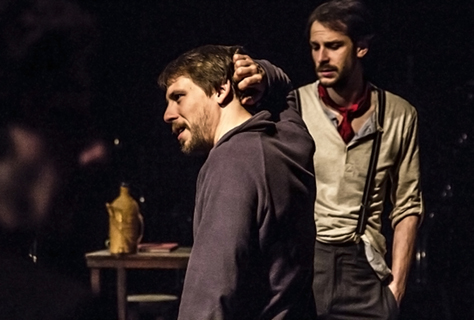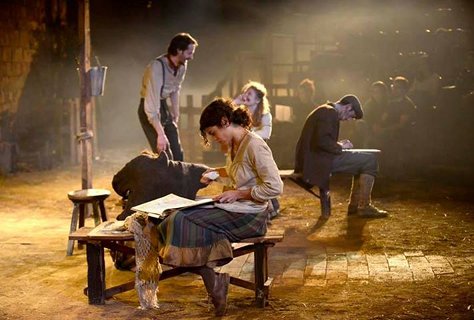05.02.2014 - 12:58
It’s 1833 and we’re in a village in County Donegal in Ireland. A British army command rolls in with the mission of changing the place names into English and building a school where the Irish language will not be taught. This is the backdrop for ‘Traduccions – Translations‘, a play by Brian Friel, adapted and directed by Ferran Utzet that is being performed at the Library of Catalonia (Biblioteca de Catalunya) until March 9. While avoiding judgments and stark positions, the work invites the audience to reflect on the relationship between identity and landscape and the consequences of linguistic substitution. ‘If we lose the words, we lose the concepts,’ says Utzet, summing it up in this interview with VilaWeb.
What made you decide to adapt ‘Translations’ into Catalan?
It was at the invitation of Miquel Berga, Professor of English Literature at Pompeu Fabra University. He told us in a conference that ten years ago he started grabbing everyone and asking that they bring ‘Translations’ to Barcelona, because he thought that it was a very relevant piece. The work languished in the idea bin of Perla 29 and now the current reality has made it ever more necessary. It describes the death of Gaelic and also the collapse of a way of life that worked, that was ancient and basic but that was also rich and grounded in the land. The play explains how all this changes thanks to the imperial British colonization and assimilation campaign. And right now we see a very concrete offensive against our language. The front page of the newspaper on the day of the premiere seemed like the front page of any paper from the play.
It’s almost impossible not to make comparisons with the situation of Catalan in the Catalan Countries. Can ‘Traduccions’ be considered a warning of what might happen?
At the very least, it is a warning about the possibility of violence, which is one of the worrying things that we have on the table. The author of ‘Translations’ Brian Friel, smoothly described how violence emerged almost by accident out of a very tense situation. He explains the underlying violence of the colonizers which readily appeared when they got angry. And in the play the differences between the mechanisms of the British and Spanish empires are easily discerned, even as they attempt to explain how right they are. The British Empire didn’t base its strategy of conquest and assimilation on any moral superiority, the way the Spanish Government has always done, but rather on ideas about commerce. That is more effective as a colonizing strategy, and also more underhanded, which in turn makes resistance that much more difficult: it doesn’t raise people’s hackles so directly, as for example, Minister Wert’s decisions do.
In one of the notes that you wrote about the play, you say that it responds to the question about how a people with such a strong identity can sacrifice their language in their struggle for independence. Why did they let it happen?
That’s the question. We even went to Donegal, where the play is set, a place where the presence of Gaelic is traditionally very strong. And the people don’t speak it. Currently only 3% use the language in their daily lives. There are various answers, but none of them are clear. And none of us, who attribute so much of our identity to language, can understand it. On the one hand, there was the potato famine and so much death, that in just a few years half the population was lost. Many people died and many others emigrated to the United States. And you also have to keep in mind that at that moment the British Empire was synonymous with progress. Any chance of getting out of the misery in which the Irish lived required learning English and leaving their country, either for England or for the US. It’s worth mentioning that the Irish didn’t erase their identity. In fact, they are a people that still exist in our collective conscience, in cinema, literature, theater and music. They chose to use English. As the translator of the play, Joan Sellent, says, they convinced the English in their own language. To a certain extent, they sacrificed their language, which for us is incomprehensible, but they made themselves strong with their new language. And they did it really quickly, in just one hundred years.
Do you think there is a danger that something similar could happen here?
No. It’s really hard for me to imagine a Spanish-speaking independent Catalonia. Impossible. A part from the fact that I really don’t want to lose our language. It’s not an easy process. We have based a lot of our identity on language, and if they take it from us, they’ll leave us unprotected. And in that sense, this play invites the audience to reflect, because it’s surprising that everything that we’ve described happened in just one hundred years. That they lost their language but they became independent. In fact, an Irish company that came to perform the work in 2001 said during the press conference, “We are independent but we have lost our language, and you are not independent but you maintain your language. I’m not sure which is better.” It would be better to have both, if you ask me. But it helps to assess the work that’s been done these last years to keep Catalan alive—not just since the transition, but also during the last three hundred years. This work shows that it’s not easy, and that all of these attacks and attempts to torpedo our language that we are seeing are part of a strategy for annihilating our strongest identity marker.
We can see that in Catalonia as they try to destroy linguistic immersion in the schools; and in the Balearic Islands with the law of public administration or the language decrees; and in Valencia with the suppression of communication media and the lack of adequate schooling in the Catalan language; and in the Franja de Ponent with the law on what they call LAPAO, etc. Spanish centralism seems to know exactly where to attack.
The Irish, even though they don’t speak their own language, were able to become independent through perseverance and resistance, but also with a civil war. But yes, the Spanish government knows very well that the Catalan Countries base our identity on our language and that’s why they do what they do. They are small decisions, sometimes seemingly arbitrary or random, like changing place names, that over the years start to take hold and forge a new history. If you lose the words, you lose the concepts.
The play touches on many themes. There is a story of impossible love, the destruction of the rural lifestyle, and also the education model…
The Irish were very interested in their culture and the contact with classic traditions. The play describes how the English eliminated the self-managed country schools: instead of prohibiting them, they constructed fancy new ones with more resources, where everything was done in English. It was a very devious system of destruction. Here, the attack on the Catalan language is also an attack on the schools. It hits close to home for me, because my mother is a teacher in a public high school in Barcelona. What is happening now is savage and it is not just an offensive against the linguistic model but also on the education model itself.
What kinds of feelings would you like to leave people with after they’ve seen the play?
I would like them to leave with a feeling that is harder and harder to produce: that we’ve explained a great story through the lives of a handful of characters. The play tries to recover the taste of every day theater. And that can connect tradition to modernity, if it’s well done. And in our case, the play is performed by very good actors. Each has a character and that helps the audience empathize with their stories. And at the same time, with the story of the destruction of a way of life and the loss of a language. I would like people to leave with the sensation of having spent an afternoon at the theater that perhaps has made them think—or maybe not, and maybe it’s not necessary—but that has made the time fly by and put them in the shoes of others. That would be great.




